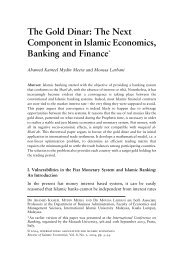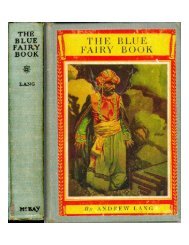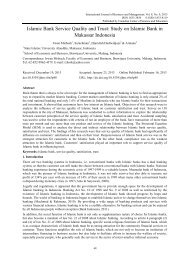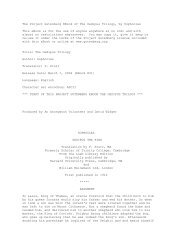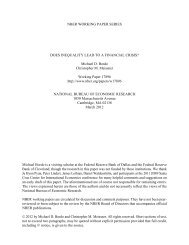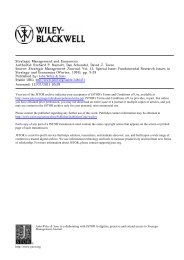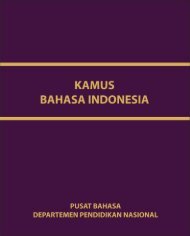The Oil Industry in Nazi Germany, 1936-1945
The Oil Industry in Nazi Germany, 1936-1945
The Oil Industry in Nazi Germany, 1936-1945
Create successful ePaper yourself
Turn your PDF publications into a flip-book with our unique Google optimized e-Paper software.
256 BUSINESS HISTORY REVIEW<br />
hydrogenation-relative to the other major synthetic oil process,<br />
Fischer-Tropsch. Other aspects of the <strong>in</strong>dustry will receive relatively<br />
little attention-storage and distribution of petroleum, German pro-<br />
duction of synthetic fuel by other, less important processes, German<br />
oil firms and oil policy outside of <strong>Germany</strong>, and the use of imported<br />
petroleum.4<br />
AUTARKY AND THE OIL INDUSTRY<br />
Close cooperation between <strong>in</strong>dustry and government dur<strong>in</strong>g the<br />
early years of the <strong>Nazi</strong> period was based on two <strong>in</strong>terrelated policies.<br />
<strong>The</strong> first was the policy of rearmament, the second a commitment to<br />
the development of a domestic base <strong>in</strong> certa<strong>in</strong> key raw materials, most<br />
notably iron ore, rubber, and petroleum. <strong>The</strong> latter policy is often re-<br />
ferred to as autarky. Agreement with government policies led some<br />
<strong>in</strong>dustrialists to support the <strong>Nazi</strong>'s <strong>in</strong>itial seizure of power and a much<br />
larger cross-section of the bus<strong>in</strong>ess community to support the regime<br />
<strong>in</strong> its early years. But by <strong>1936</strong> differences <strong>in</strong> the assumptions under-<br />
ly<strong>in</strong>g those policies had led to a rift, not only between the National<br />
Socialist government and large segments of <strong>in</strong>dustry, but also with<strong>in</strong><br />
<strong>in</strong>dustry.<br />
Some segments of the German bus<strong>in</strong>ess community <strong>in</strong> the late 1920s<br />
and early 1930s sympathized with rearmament <strong>in</strong> pr<strong>in</strong>ciple as a means<br />
to establish German political equality with the other great powers. <strong>The</strong><br />
policy became attractive to a much larger segment of German bus<strong>in</strong>ess<br />
with the onset of the world economic crisis <strong>in</strong> 1929, which provided<br />
an additional and more press<strong>in</strong>g reason for support<strong>in</strong>g rearmament.5<br />
State spend<strong>in</strong>g on arms, and on nonarmaments items for the military,<br />
would stimulate the stagnated economy, especially <strong>in</strong> the heavy <strong>in</strong>dus-<br />
trial sector (coal, iron, and steel). This predom<strong>in</strong>antly economic moti-<br />
<strong>The</strong>re is no recent study of the storage and distribution of petroleum <strong>in</strong> <strong>Germany</strong>, although the <strong>Oil</strong><br />
Division F<strong>in</strong>al Report <strong>in</strong>cludes a good overview. Arnold Krammer, "Fuel<strong>in</strong>g the Third Reich," Technology<br />
and Culture 19 (July 1978), although almost exclusively concerned with the major synthetic oil producers<br />
<strong>in</strong> <strong>Nazi</strong> <strong>Germany</strong>, <strong>in</strong>cludes material on other synthetic or substitute fuels (such as alcohol, Benzdl, and<br />
Treibgas); see 414. Krammer also deals briefly with imports of oil from Eastern Europe (408-9). As for<br />
the foreign activities of the German oil <strong>in</strong>dustry, Helmut Mejcher has begun a projected multivolume<br />
study on politics and oil <strong>in</strong> the Middle East before World War II with the very good Die Politik und das<br />
01 im Nahen Osten, vol. 1, Der Kampf der Mdchte und Konzerne vor dem Zweiten Weltkrieg (Stuttgart,<br />
1980).<br />
5 Ernst Nolte, "Big Bus<strong>in</strong>ess and German Politics: A Comment," American Historical Review 75 (Oct.<br />
1969): 75; Alan Milward, War, Economy and Society 1939-<strong>1945</strong> (Berkeley, Calif., and Los Angeles, 1977),<br />
10-14. <strong>The</strong> precise nature of the relationship between German bus<strong>in</strong>ess and <strong>Nazi</strong>s both before and after<br />
the seizure of power is a subject of considerable historiographical controversy. An excellent summary of<br />
the debate and the literature relevant to it is <strong>in</strong> Re<strong>in</strong>hard Neebe, Grop3<strong>in</strong>dustrie, Staat und NSDAP 1930-<br />
1933: Paul Silverberg und der Reichsverband der deutschen Industrie <strong>in</strong> der Krise der Weimarer Repub-<br />
lik (Giott<strong>in</strong>gen, 1981), 9-18, esp. 15-18. For Neebe's own well-reasoned and well-documented analysis<br />
of these relations to 1933, see 117-26, 200-203.



